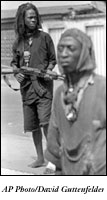Rebel group frees German reporter; five other journalists still held hostage
Click here to read more about press freedom conditions in the PHILIPPINES New York, July 27, 2000 — Andreas Lorenz, the Der Spiegel reporter who was captured by armed rebels on the southern island of Jolo on July 2, was released today. He is currently en route to Hamburg with his wife, Jutta, and Der…
Muslim militants abduct two Filipino journalists; four kidnapped foreign journalists still in captivity
Click here to read more about press freedom conditions in the PHILIPPINES New York, July 24, 2000 — Two journalists from ABS-CBN, the largest television network in the Philippines, were kidnapped today near the town of Patikul on the island of Jolo. Cameraman Val Cuenca and researcher/writer Maan Macapagal were abducted by four armed men…
Philippines: Kidnapped German journalist still missing
Your Excellency: The Committee to Protect Journalists (CPJ) is deeply concerned about the safety of German journalist Andreas Lorenz, apparently kidnapped July 2 on the southern island of Jolo. CPJ calls on your government to ensure he remains unharmed and to secure his immediate release.
German journalist is kidnapped by rebel faction
Click here to read more about press freedom conditions in the PHILIPPINES Read CPJ’s letter New York, July 3, 2000- A German journalist was kidnapped at gunpoint on July 2 in the southern island of Jolo in the Philippines, according to international news reports.
Côte d’Ivoire: Government announces plans to muzzle press
Your Excellency: The Committee to Protect Journalists (CPJ) is gravely disturbed by your regime’s plans to tighten state control over the press in Côte d’Ivoire. According to CPJ’s sources in Abidjan, Information Minister Captain Henri Cesar Sama announced on June 23 that the ruling National Public Salvation Committee (CNSP) would soon release a list of measures designed to block the publication of any information “likely to negatively affect the credibility of journalists, national security and social peace.”
CÔTE D’IVOIRE GOVERNMENT ANNOUNCES CENSORSHIP PLAN
Click here to read more about press freedom conditions in CÔTE D’IVOIRE New York, June 28, 2000-The Committee to Protect Journalists (CPJ) is gravely disturbed by plans announced by the military government of the Côte D’Ivoire to tighten control over the editorial content of local newspapers and other media outlets.
Two journalists killed by gunmen; two others wounded
Click here to read more about press freedom conditions in SIERRA LEONE New York, May 24, 2000 — The Committee to Protect Journalists is outraged by the latest murderous attack on journalists in Sierra Leone, which claimed the lives of two western journalists and left two others injured on Wednesday, according to news agencies and…
Attacks on the Press 1999: 1999 Death Toll: Listed by Country
[Click here for full list of documented cases] At its most fundamental level, the job of a journalist is to bear witness. In 1999, journalists in Sierra Leone witnessed rebels’ atrocities against civilians in the streets of Freetown. In the Balkans, journalists watched ethnic Albanians fleeing the deadly menace of Serbian police and paramilitaries. In…

Attacks on the Press 1999: The Trauma of Sierra Leone
Introduction On January 6, 1999, rebel forces entered Freetown and launched a campaign of terror. Revolutionary United Front (RUF) fighters systematically murdered, mutilated, and raped thousands of civilians. During the three weeks that it took for Nigerian-led West African peacekeeping troops to expel the rebels from Freetown, Sierra Leone officially became the most dangerous country…
Attacks on the Press 1999: Algeria
Since his controversial, unopposed April 15 election, President Abdelaziz Bouteflika has raised public hopes of ending the brutal civil strife that has plagued this North African nation for eight years. Buoyed by the president’s efforts to promote national reconciliation, Algerians eagerly sought to resume their normal lives after years of bloodshed. For the country’s press,…